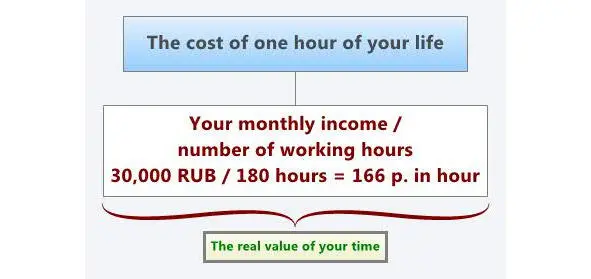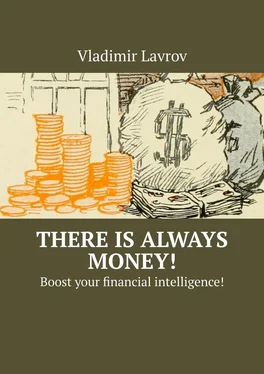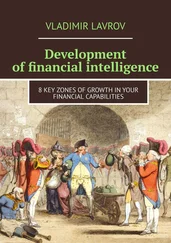Fear nothing! You will definitely succeed! Your rich brain is sure to win the battle against the poor brain if you side with it!The main thing is never, never, never give up! Change your attitude towards money, set ambitious financial goals, overcome difficulties, increase the value of your hour, increase the total value of your assets, and never stop learning! If you are serious, then you will definitely succeed!
P.S. Initially, the book was written in Russian and only after that it was translated into English. Due to the specific differences between Russian and English, the author could allow minor inaccuracies in the translation. Do not judge strictly, for the English language for the author is not native. If possible, treat indulgently with possible mistakes and wrong words in the text. Remember that only those who do nothing do not make mistakes! Try to understand the essence of what the author wanted to say. Then you will get the most benefit from reading this book.
Lesson number 1. Cost per hour
Time is the most important and invaluable resource that cannot be bought, stopped, extended or prepared for future use. It just flows, but a lot depends on the efficiency of its use, both in work, and in creativity, and in business, and in relationships.
Therefore, it is important to immediately understand how much your time is worth. And then – to understand how to dispose of them wisely.
The cost of an hour of your time is one of the main indicators of the level of development of your financial intelligence( other key indicators of the level of development of financial intelligence are the scale of financial goals, delta size, and total cost of capital ). The higher your financial intelligence, the higher the cost per hour of your time (as well as the scale of financial goals, delta size and total cost of capital) .
To determine how much one hour of your life is really worth, take your monthly income and divide it by the number of hours you spend working. If you work for an employee in a government organization, then this is usually the standard 170—180 hours per month (provided that you live close to work and do not spend a lot of time traveling). If you work in a commercial structure or build your own business and devote more than 8 hours a day to work, then add the required number of hours to the standard working time, and then add to this amount the time you spend on the road to work and home, and then calculate the real cost of your time using the formula:
monthly income / working hours per month = the real cost of an hour in your life
Let’s say 30,000 rubles. / 180 hours = 166 p. in hour. Or 100,000 rubles. / 80 hours = 1250 p. in hour.

The cost of one hour of your life
Calculate the cost per hour of your working time using the formula above.
If you are a wage earner, take your monthly income and divide it by the number of hours you spend in a month working and commuting from / to work.
If you are working as a self-employed or sole proprietor, divide the cost of your services by the number of hours you work. If you receive money not for the result, but for the time (for example, you consult or teach with an initial reference to the cost of an hour), then take as a starting point the lowest cost threshold, below which you do not take on work.
If you are an investor (that is, you live on income from capital) or have several sources of income, then calculate the average monthly total income and divide it by the number of hours you spend per month working.
Remember the resulting cost of time. This is your point A (the point where you are right now). Think of what should ideally be a point B(cost of one hour of your time in a year), point B(cost of one hour of your time in 5 years) and point D(cost of one hour of your time in 10 years).
Record the calculation results in the table:

Now that you know the value of your time, you can consciously spend your money shopping. Let’s say if you spend 500 rubles. per book, you understand that this price is equivalent to 3 hours of your work. If you need to buy shoes or a dress for 5,000 rubles, you understand that this price is equivalent to 30 hours of your work or 4 full working days. If you need to buy a sofa or a table for 15,000 rubles, you understand that this price is equivalent to 90 hours of your work, or 11 full working days.
So, when you spend your earned money on goods and services – you are actually spending small chunks of your life! Understanding this, you will not waste money just like that, buying what you do not need. You will begin to analyze not how much a given purchase costs in rubles, but how much it costs in terms of the time of your life. And then you will buy some important things despite the high price in monetary terms, and on the contrary, you will refuse some important things, despite the low price in monetary terms.
Think about how you could add value to your time. Answer the following questions in writing:
– What am I good at? What exactly do I get money for?
____________________________________________________________________
____________________________________________________________________
____________________________________________________________________
– How can you increase your income by investing less time in your work than you do now?
____________________________________________________________________
____________________________________________________________________
____________________________________________________________________
– What knowledge and skills do I need to acquire so that my value to the employer, determined by the cost of one hour of my work, doubles?
____________________________________________________________________
____________________________________________________________________
____________________________________________________________________
– What can you invest the time freed from «extra work»
____________________________________________________________________
____________________________________________________________________
____________________________________________________________________
Continuing the topic:
Think about how much time is left in your account and how much it should really cost. Write down (in a notebook, in a notebook, in a diary, in your blog) what you learned today and what conclusions you made today:
What new have I learned?
____________________________________________________________________
____________________________________________________________________
____________________________________________________________________
What conclusions have I drawn?
____________________________________________________________________
____________________________________________________________________
____________________________________________________________________
Yes, it must be done in writing! Yes, it must be done! Yes, you need to do it now! Yes, if this is not done in writing and immediately, then it is not done at all. How do you – go to the second lesson.
Читать дальше














